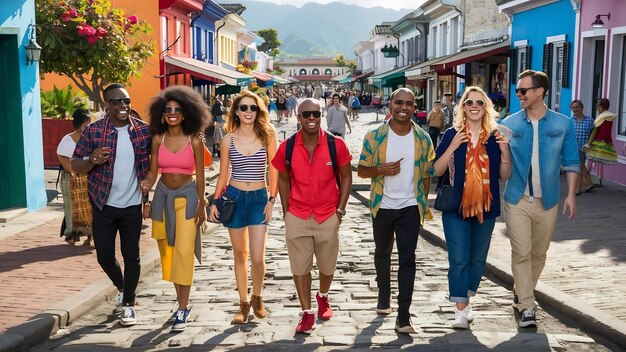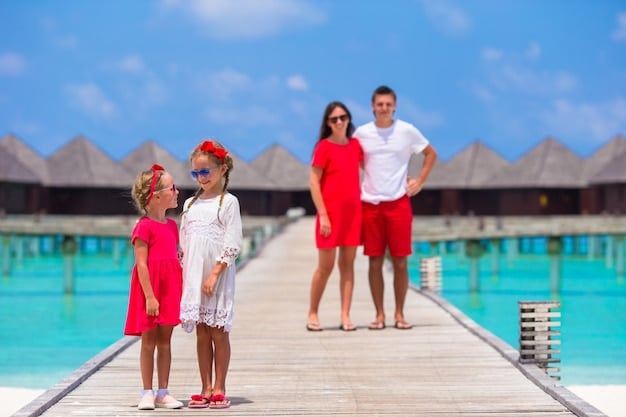Travel Marketing: Adapting to Changing Consumer Preferences in 2025

Travel brands are adapting their **marketing strategies** by focusing on personalization, digital experiences, sustainability, and safety to meet **changing consumer preferences** in the evolving landscape of the travel industry.
The way travel brands connect with consumers is undergoing a seismic shift. Understanding **how travel brands are adapting their marketing strategies in response to changing consumer preferences** is crucial for staying competitive and relevant in today’s dynamic market.
Understanding the Evolution of Consumer Preferences in Travel
Consumer preferences in travel have drastically changed over the past decade and are anticipated to continue to evolve. Understanding these shifts is vital for travel brands aiming to maintain and grow their customer base.
The Rise of Experiential Travel
Travelers are increasingly seeking unique, authentic experiences rather than generic tourist activities. This shift emphasizes immersion in local culture, adventure, and personal enrichment.
Demand for Personalized Travel Experiences
Generic marketing no longer resonates with today’s travelers. Consumers expect personalized recommendations, tailored itineraries, and customized service that align with their individual interests and preferences.
- Hyper-Personalization: Using data analytics to offer bespoke travel plans.
- Customized Itineraries: Allowing travelers to build their ideal trip from scratch.
- Dynamic Pricing: Adjusting prices based on individual traveler profiles and real-time demand.
The shift towards experiential and personalized travel underscores the need for travel brands to adopt a customer-centric approach. By focusing on individual preferences and delivering unique experiences, brands can foster loyalty and capture a larger market share.

Digital Transformation in Travel Marketing Strategies
The digital landscape has fundamentally transformed how travel brands market their services. Embracing digital transformation is no longer optional but essential for reaching and engaging with today’s tech-savvy travelers.
The Power of Social Media Marketing
Social media platforms are powerful tools for travel brands to showcase destinations, engage with potential customers, and build brand loyalty. Influencer marketing, user-generated content, and targeted advertising are key components of a successful social media strategy.
Enhancing User Experience with Mobile-First Strategies
With the majority of travelers using mobile devices for booking and planning, a mobile-first strategy is crucial. Optimizing websites and apps for mobile devices ensures a seamless booking experience and provides travelers with on-the-go access to information and services.
- Mobile-Friendly Websites: Ensuring websites are responsive and easy to navigate on smartphones.
- Travel Apps: Providing travelers with booking options, itinerary management, and real-time updates.
- Location-Based Services: Offering personalized recommendations and deals based on the traveler’s current location.
Digital transformation plays a pivotal role in adapting to **changing consumer preferences**. By leveraging social media, optimizing for mobile devices, and implementing data analytics, travel brands can create more personalized, engaging, and effective marketing campaigns.
Sustainability and Ethical Travel: A Growing Priority
Consumers are increasingly concerned about the environmental and social impact of their travel choices. Travel brands that prioritize sustainability and ethical practices are more likely to attract and retain environmentally-conscious travelers.
Promoting Eco-Friendly Accommodations and Transportation
Highlighting eco-friendly accommodations, transportation options, and sustainable tour operators is essential. By showcasing their commitment to sustainability, travel brands can appeal to travelers looking to minimize their environmental footprint.
Supporting Local Communities and Cultural Preservation
Travelers are increasingly interested in supporting local communities and preserving cultural heritage. Travel brands can promote community-based tourism, support local businesses, and contribute to cultural preservation efforts.
Embracing sustainability and ethical travel is not only good for the planet but also makes business sense. By aligning with consumer values and promoting responsible travel practices, travel brands can enhance their reputation, attract new customers, and contribute to a more sustainable future for the tourism industry.
Safety and Health Measures: Adapting to New Concerns
In the wake of global health crises, safety and health measures have become paramount for travelers. Travel brands must adapt their marketing strategies to address these concerns and reassure potential customers.
Communicating Enhanced Hygiene Protocols
Communicating enhanced hygiene protocols and safety measures is essential for building trust and confidence. Travel brands should clearly articulate the steps they are taking to protect travelers’ health and safety, such as enhanced cleaning procedures, social distancing measures, and mask requirements.
Offering Flexible Booking and Cancellation Policies
Travelers are seeking flexibility and peace of mind when booking travel. Offering flexible booking and cancellation policies allows travelers to adjust their plans if necessary, reducing the risk associated with unforeseen circumstances.

- Flexible Dates: Allowing travelers to change their travel dates without penalty.
- Free Cancellations: Providing full refunds for cancellations made within a specified timeframe.
- Travel Insurance: Offering comprehensive travel insurance options to protect against unexpected events.
By prioritizing safety and health measures and communicating these efforts effectively, travel brands can build traveler confidence and encourage bookings. Flexibility in booking policies and enhanced health protocols are key to adapting to the new realities of travel.
Leveraging Data Analytics for Personalized Marketing
Data analytics plays a crucial role in personalizing marketing efforts and delivering targeted messages that resonate with individual travelers. By leveraging data insights, travel brands can create more effective and engaging campaigns.
Collecting and Analyzing Customer Data
Collecting and analyzing customer data is essential for understanding traveler preferences, behaviors, and needs. Travel brands can gather data through various sources, such as website analytics, social media interactions, booking history, and customer surveys.
Creating Targeted Marketing Campaigns
Using data insights to create targeted marketing campaigns allows travel brands to deliver personalized messages that are relevant and timely. By segmenting customers based on their interests, demographics, and travel history, brands can tailor their marketing efforts to maximize engagement and conversions.
Leveraging data analytics enables travel brands to create personalized marketing experiences that cater to individual **consumer preferences**. By collecting and analyzing customer data, brands can create targeted campaigns that increase engagement, drive bookings, and foster customer loyalty.
Collaboration and Partnerships for Expanded Reach
Strategic collaborations and partnerships can significantly expand the reach and impact of travel marketing campaigns. By working with complementary businesses and organizations, travel brands can tap into new audiences and offer more comprehensive travel experiences.
Partnering with Local Businesses and Influencers
Collaborating with local businesses, such as restaurants, tour operators, and retailers, allows travel brands to offer authentic and immersive experiences. Partnering with influencers can also drive awareness and credibility, as influencers can share their experiences with their followers.
Cross-Promotional Campaigns with Complementary Brands
Cross-promotional campaigns with complementary brands, such as airlines, hotels, and travel insurance providers, can offer travelers a more comprehensive and seamless travel experience. By bundling services and offering exclusive deals, brands can increase customer value and drive bookings.
Collaboration and partnerships are essential for expanding reach and offering comprehensive travel experiences. By partnering with local businesses, influencers, and complementary brands, travel companies can enhance their marketing efforts and increase customer value.
| Key Point | Brief Description |
|---|---|
| 🌍 Sustainability | Eco-friendly travel options are becoming crucial for conscious travelers. |
| 📱 Digitalization | Mobile-first strategies and social media engagement define modern travel booking. |
| 🛡️ Safety Measures | Enhanced hygiene protocols and flexible policies ensure traveler confidence. |
| 📊 Data Analytics | Personalized marketing thrives on collecting and analyzing customer data. |
Frequently Asked Questions (FAQ)
▼
Travel brands can enhance their digital presence by optimizing their websites for mobile devices, engaging actively on social media, and using SEO techniques to improve search engine rankings.
▼
Personalization is critical. Brands use data analytics to tailor travel recommendations, offers, and experiences to match individual preferences, boosting customer satisfaction and loyalty.
▼
Travelers are increasingly aware of environmental issues, prompting them to choose eco-friendly options. Brands highlighting sustainable practices attract and retain environmentally-conscious customers.
▼
Enhanced hygiene protocols and flexible booking options reassure travelers. Communicating these measures effectively builds trust and encourages bookings in uncertain times.
▼
Collaborations with local businesses, influencers, and complementary brands expand reach and offer comprehensive travel experiences, enhancing marketing campaign effectiveness and customer value.
Conclusion
Adapting to **changing consumer preferences** is a continuous journey for travel brands. By embracing digital transformation, prioritizing sustainability and safety, leveraging data analytics, and fostering strategic partnerships, travel brands can create compelling marketing strategies that resonate with today’s travelers and ensure long-term success.





